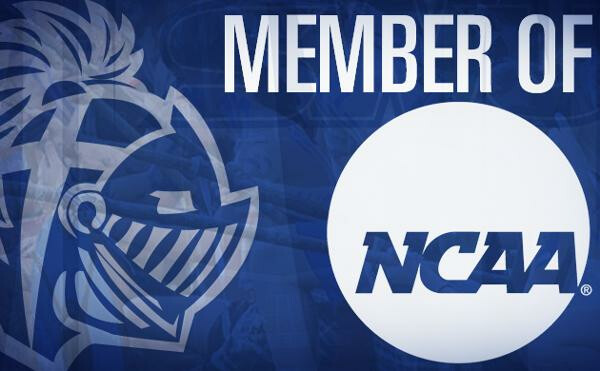Southern Wesleyan University Approved for Full NCAA Division II Membership

Jul 20, 2016 | Athletics
Southern Wesleyan University has been accepted as a full member of NCAA Division II, as determined by the NCAA Division II Membership Committee and Management Council.
"With the growth Southern Wesleyan has been experiencing since our initial NCAA application three years ago, this decision could not have come at a better time in our history," said Southern Wesleyan University President Dr. Todd Voss. "Our entire campus and surrounding community believe this move to the NCAA is a game changer for our students, our impact and our future together!"
The Warriors began the process in the 2013-14 school year where they spent two years in the Candidacy Year phase and spent the past school year in the Provisional Year phase. Southern Wesleyan has competed as a transitional member of Conference Carolinas the past two years, but were ineligible for conference awards, NCAA awards, conference championships, and NCAA postseason. The Warriors will enter full NCAA Division II membership Sept. 1 and will be eligible for Conference Carolinas and NCAA postseason.
"On behalf of the SWU community and our athletics department, we are proud and excited to be accepted as full members of Conference Carolinas and NCAA Division II," said Director of Athletics Chris Williams. "This three year membership process has made SWU stronger, better and more unified than ever before. I am proud of the perseverance and tenacity of our transition team which includes so many people from many different departments across campus, our local community leaders, our alumni, our coaches and our student-athletes. The 'journey' could be seen as accomplished, however we at SWU believe that this only continues our journey and our opportunity to lead as a Christ-centered university while participating in a spirit of competition within Conference Carolinas and the NCAA.
Conference Carolinas has 12 member schools located in Georgia, North Carolina, South Carolina, and Tennessee. These schools include: Barton College (Wilson, N.C.), Belmont Abbey College (Belmont, N.C.), Converse College (Spartanburg, S.C.), Emmanuel College (Franklin Springs, Ga.), Erskine College (Due West, S.C.), King University (Bristol, Tenn.), Lees-McRae College (Banner Elk, N.C.), Limestone (Gaffney, S.C.), University of Mount Olive (Mount Olive, N.C.), North Greenville University, (Tigerville, S.C.), and Pfeiffer University (Misenheimer, N.C.).
"The much anticipated membership of Southern Wesleyan University is an attractive addition to Conference Carolinas and NCAA Division II," said Conference Carolinas Commissioner Dr. Alan Patterson. "The Warriors have demonstrated the competitive spirit, sportsmanship and priority of positive student athlete experiences that distinguish all our members during the last two years of competition within Conference Carolinas. We welcome Southern Wesleyan as full members of Conference Carolinas and NCAA Division II."
During the three-year transition from NAIA to NCAA Division II, Southern Wesleyan has won two National Christian College Athletic Association men's soccer national championships, a men's golfer finished first at the 2013 NCCAA National Tournament, and four track & field relay teams and two individuals won national titles at the NCCAA National Championships. The Warriors had 69 NCCAA All-Americans, 52 NCCAA All-Region selections, and 57 NCCAA Scholar-Athletes during that time frame. Southern Wesleyan will continue their membership with the NCCAA as they become full members of NCAA Division II.
The Warriors join Holy Names University (Oakland, Calif.), Rogers State University (Claremore, Okla.), and Mississippi College (Clinton, Miss.) as the newest members of NCAA Division II. The division's membership will expand to 310 colleges and universities this fall.
"The NCAA membership process was a pressing journey," said Assistant Athletics Director and Head Men's Basketball Coach Charles Wimphrie. "The last three years has been stringent for everyone involved, but I am gratified to be a part of history at Southern Wesleyan University. The NCAA is a prestigious association and I am delighted that Southern Wesleyan has been accepted as full NCAA Division II members."
Southern Wesleyan University NCAA Timeline
June 2013: Southern Wesleyan applies for NCAA Division II membership and receives invitation to join Conference Carolinas.
July 2013: NCAA Membership Committee denies application.
September 2013: NCAA Management Council approves Southern Wesleyan for Candidacy Year One after appeals process.
January 2014: Representatives of Southern Wesleyan attend first NCAA National Convention.
July 2014: NCAA Membership Committee recommends Southern Wesleyan repeat Candidacy Year One, but Management Council overturns their decision and approves Southern Wesleyan to move onto Candidacy Year Two.
July 2015: Southern Wesleyan moves to Provisional status and the final year of the membership process.
July 2016: Southern Wesleyan is approved as a full member of NCAA Division II and will be eligible for Conference Carolinas and NCAA postseason starting with the 2016-17 school year.
About the NCAA Division II
Founded in 1906, the NCAA conducts 89 championships in 23 sports across Divisions I, II and III, with 44 championships administered for women and 42 for men.
The NCAA Division II is a collection of more than 300 colleges and universities that provide thousands of student-athletes the opportunity to compete at a high level of scholarship athletics while exceling in the classroom and fully engaging in the broader campus experience. This balance, in which student-athletes are recognized for their academic success, athletics contributions, and campus and community involvement, is at the heart of the Division II philosophy.
The Division II approach provides growth opportunities through academic achievement, learning in high-level athletics competition and a focus on service to the community. The balance and integration of these different areas of learning provide Division II student-athletes with a path to graduation while cultivating a variety of skills and knowledge for life after college.